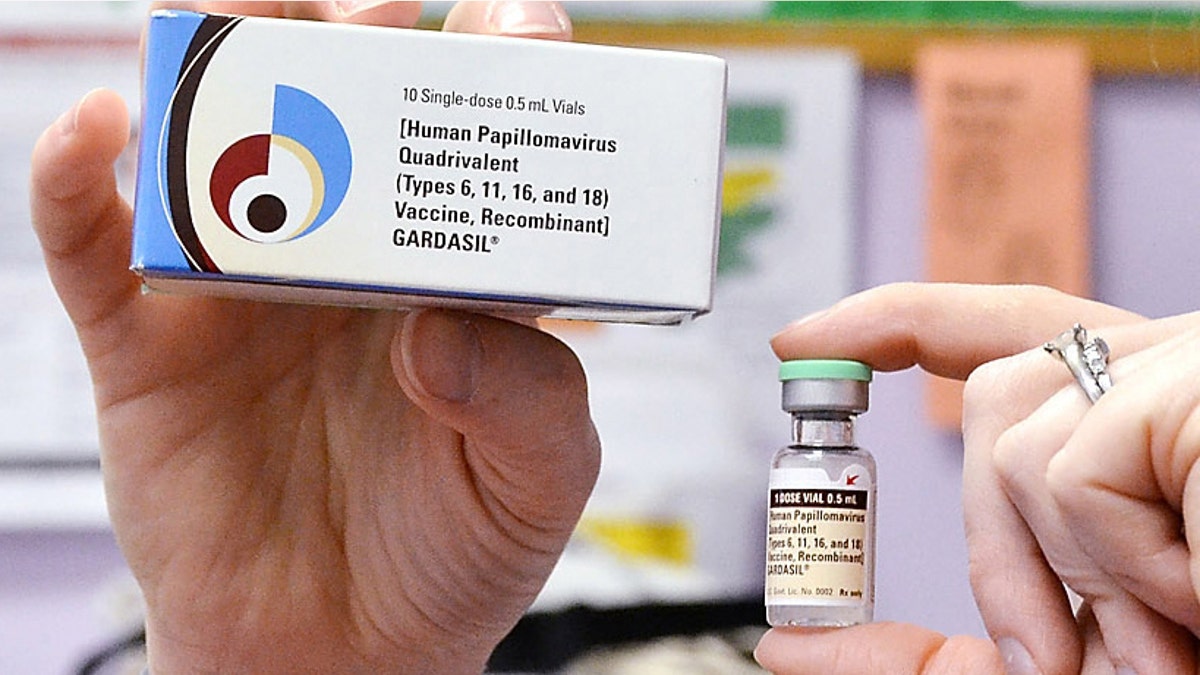
FILE - A child health nurse holds up a vial and box for the HPV vaccine, brand name Gardasil, at a clinic in Kinston, N.C. on Monday March 5, 2012. A vaccine against a cervical cancer virus has cut infections in teen girls by half, according to a study released Wednesday, June 19, 2013. The study confirms research done before the HPV vaccine came on the market in 2006. But this is the first evidence of how well it works now that it is in general use. (AP Photo/Daily Free Press, Charles Buchanan) (A2012)
Health officials issued new recommendations this week in an update to the vaccine schedule for children, including a recommendation to get a new type of vaccine against HPV, and an update to the timing of this vaccine for some children.
The updated schedule for children and teens was released by the Centers for Disease Control and Prevention, along with a corresponding policy statement from the American Academy of Pediatrics.
The update is an opportunity to remind people that "vaccine-preventable disease is at historically low levels for almost every single vaccine," said Dr. Cody Meissner, a co-author of the new policy statement and a pediatric infectious-disease specialist at Tufts University in Boston. "And the reason for that is because vaccine uptake is at historically high levels."
"If we have a decrease in immunization rates, we are going to see these diseases return," Meissner said, citing the recent outbreaks of measles and whooping cough as possible examples of this.
One change in the updated schedule is the introduction of a new type of HPV vaccine, called 9vHPV, which was approved by the Food and Drug Administration in December 2014. The previously recommended vaccine, called 4vHPV, offered protection against four types of HPV associated with certain types of cancer.
The new vaccine adds protection against five more types of HPV linked to cancer, particularly cervical cancer, Meissner said. [5 Dangerous Vaccine Myths]
"That means that the HPV-4 vaccine covered about 65 percent of the viruses that cause cervical cancer, and the HPV-9 will prevent about 80 percent of the viruses that cause cervical cancer," Meissner told Live Science.
The new schedule continues to recommend that the HPV vaccine be given to children beginning at age 11. However, the new schedule now recommends that children with a history of sexual abuse receive the first dose of the vaccine at age 9, because they have an increased risk of HPV infection.
This increased risk is partly because children who have suffered abuse are more likely to become sexually active at an earlier age, Meissner said.
Meningitis prevention
The updated vaccination schedule now also includes the addition of the meningococcal B vaccine for some adolescents. The vaccine protects against the rare but potentially life-threatening bacterial infection that can affect the brain.
The vaccine is recommended at age 10 for children who are at an increased risk of contracting the disease. This high-risk group includes kids with certain immunodeficiencies, such as those who have had to have their spleen removed, Meissner said. Individuals who don't have a high risk of contracting the disease can be considered for the vaccine between ages 16 and 18, depending on their doctor's recommendation.
The meningococcal B vaccine was approved by the Food and Drug Administration in 2014 in response to several outbreaks of bacterial meningitis at colleges in the United States.
Vaccination schedules for children and teens are approved annually by the American Academy of Pediatrics, the American Academy of Family Physicians, the Advisory Committee on Immunization Practices of the CDC, and the American College of Obstetricians and Gynecologists.
The AAP policy statement was published Monday (Feb. 1) in the journal Pediatrics.
- Why Vaccinate Your Child Against Measles? | Video
- 6 Flu Vaccine Myths
- 10 Scientific Tips For Raising Happy Kids
Copyright 2016 LiveScience, a Purch company. All rights reserved. This material may not be published, broadcast, rewritten or redistributed.








































